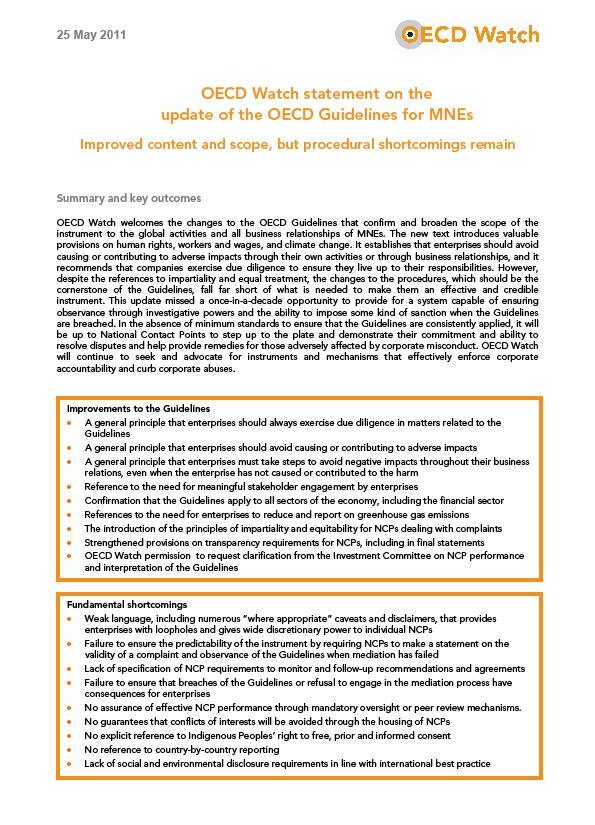
OECD Watch press release: OECD updates ethical business standards but fails to ensure enforcement
Today, on its 50th anniversary, the OECD will formally adopt a revised text of the OECD Guidelines for Multinational Enterprises – 10 years after its last major review. The Guidelines set out government expectations for responsible business conduct. While there are valuable additions to the content and scope of the Guidelines, OECD governments failed to agree on more stringent measures to ensure company compliance. This compromises the effectiveness of the OECD Guidelines in resolving conflicts between business and society. These are the conclusions of OECD Watch’s “Statement on the update of the OECD Guidelines for MNEs”, also published today.
“This was not a comprehensive review, nevertheless advances have been made with regard to human rights, due diligence, and supply chain responsibility”, stresses Joris Oldenziel, coordinator of OECD Watch. “These improvements increase the scope and relevance of the Guidelines. But without credible enforcement mechanisms, it remains to be seen whether the update will make a real difference to the day-to-day struggles of victims of corporate abuse”.
Strengthened supply chain responsibility
One significant improvement is that the Guidelines now unambiguously apply not only to the activities of companies themselves, but also to their suppliers and other companies with whom they do business. According to Victor Ricco of Argentine NGO CEDHA: “With production processes increasingly being outsourced to developing countries, multinational enterprises have a responsibility beyond the walls of their own factories. They can no longer close their eyes to the irresponsible behaviour of suppliers and other business partners”. OECD Watch welcomes the inclusion of the ‘due diligence’ principle in the new text which requires companies to take steps to avoid causing or contributing to negative impacts on individuals, communities and the environment. This places a responsibility on companies to substantially increase their efforts to assess potential negative impacts of their operations.
Lack of enforcement
A major disappointment is the failure to get agreement to strengthen the implementation procedures. Without any penalties or consequences for breaching the Guidelines, there is little incentive to comply and irresponsible companies will carry on their abusive behaviour with impunity. National Contact Points (NCPs), the government bodies responsible for dealing with complaints, are not even explicitly required to ascertain whether a company has breached the Guidelines. This undermines the credibility of the Guidelines as a global instrument. There is nothing to ensure that the standards are consistently applied by adhering countries and so enforcement will depend on the integrity and commitment of individual NCPs and their willingness to hold companies to account for misconduct. Serena Lillywhite of Oxfam Australia: “OECD Watch calls on adhering governments to step up to the plate and demonstrate their commitment to resolving disputes and helping provide remedies for those adversely affected by corporate misconduct”.
OECD Watch will continue to seek and advocate for instruments and mechanisms that effectively enforce corporate accountability and curb corporate abuses. In June the UN Human Rights Council meeting in Geneva is expected to approve a renewal of the business and human rights mandate. OECD Watch believes that one of its tasks should be to supervise the adequacy of the OECD’s complaints mechanism.
Related news
-
 Joint letter: Ban EU trade with Israel’s illegal settlementsPosted in category:News
Joint letter: Ban EU trade with Israel’s illegal settlementsPosted in category:News Lydia de LeeuwPublished on:
Lydia de LeeuwPublished on: -
 CSDDD Datahub reveals law covers fewer than 3,400 EU-based corporate groupsPosted in category:News
CSDDD Datahub reveals law covers fewer than 3,400 EU-based corporate groupsPosted in category:News David Ollivier de LethPublished on:
David Ollivier de LethPublished on: -
 Additional evidence filed against Booking.com for profiting from illegal settlementsPosted in category:News
Additional evidence filed against Booking.com for profiting from illegal settlementsPosted in category:News Lydia de LeeuwPublished on:
Lydia de LeeuwPublished on:

